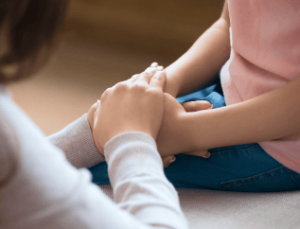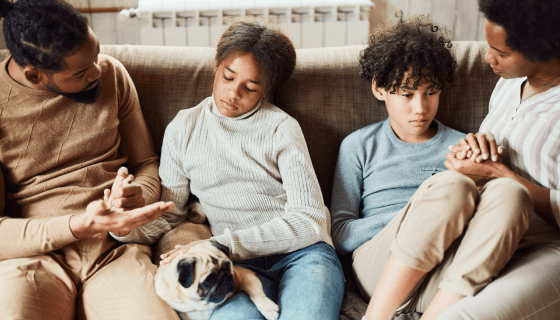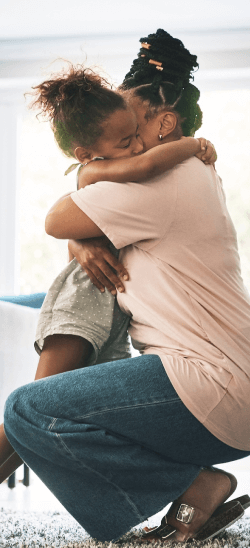Talking to Kids About Cancer
A cancer diagnosis affects every family member — including children. If you or a loved one has been diagnosed with cancer, make sure to let the children in your life know. Using simple and direct language is often the best way to tell children, no matter their age, about a cancer diagnosis. Find tips on talking to kids about cancer below.
How Do You Explain Cancer to Kids?
Telling a child that you or a loved one has cancer is an incredibly challenging, but also an important, step after a diagnosis. By letting a child know, you can better support their feelings and emotions in the wake of the news.
The American Cancer Society (ACS) has outlined some basic tips for talking about cancer with kids.

These tips include:
- Being as calm as possible when speaking to the child
- Explaining what type of cancer the affected person has and where it is
- Noting if the loved one will get cancer treatments
- Telling them how treatments may change the person’s appearance
- Taking time to answer follow-up questions
Ultimately, it’s important to let children know that they will always be loved and taken care of, no matter what.
Telling Kids About Mesothelioma
Mesothelioma is a particularly aggressive type of cancer caused by asbestos exposure. If your or a loved one has mesothelioma, it’s important to share the news with the children in your life when the time is right.
Telling children about a mesothelioma diagnosis can be particularly challenging because this cancer is quite hard to treat. Patients may also have shorter lifespans than other types of cancer.
That said, explaining the situation to children can help them cope more effectively than if you had hidden it from them.
Here are some tips when talking about mesothelioma with kids:
- Explain that it’s not contagious, especially when talking with younger children who may not understand how the illness works
- Prepare a plan of what to say before you say it
- Try to keep the discussion simple
When Should I Tell a Child Their Loved One Has Cancer?
Many leading health organizations recommend telling children about a cancer diagnosis sooner rather than later.
Parents may want to hide a cancer diagnosis at first. However, children are more intuitive than we may think. Most often, kids will be able to tell that something bad is being kept from them. This, in turn, could cause them to worry and stress — often silently since their loved ones are not discussing it openly — even more than if they had been told outright.
Ultimately, when you tell your child about a cancer diagnosis is up to you.
“Some parents know immediately that they will tell their kids about their diagnosis at the earliest opportunity. Others know they will eventually discuss the diagnosis with their children, but may delay until they have more information about the cancer and its treatment, or until the children are a bit older.”
— Dana-Farber Cancer Institute
When the time comes to talk, the MD Anderson Cancer Center recommends meeting as a family in your home or a comfortable private setting.
The Dana-Farber Cancer Institute also notes that you can share more information in follow-up conversations. Doing so can help children understand the situation more easily and encourage them to come to you with questions or other tough topics.
Mesothelioma Resource Group is dedicated to helping all who are impacted by mesothelioma, including the children and grandchildren of mesothelioma patients. Learn how we can assist you and your family with a Free Mesothelioma Guide.
 Free 2024 Mesothelioma Guide
Free 2024 Mesothelioma Guide- Find Cancer Resources
- Get Medical Care
- Access Compensation


How Children May React to News of Cancer
How kids react after hearing a loved one has cancer can vary depending on their age, their relationship with the cancer patient, and other factors.
It’s important to know that children may not act how you’d think they would after sharing the news. Some may hide their emotions on the outset, only for their feelings to come out in different ways.
After sharing news of cancer, kids may:
- Act up or try to get attention
- Ask questions, like if the cancer patient will die
- Become depressed or withdrawn
- Blame themselves or feel guilty
- Develop physical symptoms (stomach aches, headaches)
- Have trouble in school
All of these behaviors are normal, but can present long-term problems for a child. If you notice your child is struggling, you can look into support resources that can help them.
How to Support Children After Talking About Cancer
There is a wide range of options to support kids whose loved ones are facing cancer. Learn about ways to help your child manage their emotions more effectively and cope with the news.
Help for You and Children After a Cancer Diagnosis

Telling children about cancer is one of the most important conversations you’ll have. Though difficult, sharing the news can help children prepare and get answers to their concerns.
Further, if you or your child are struggling after a cancer diagnosis, emotional support resources can ease some of the burdens.
The Mesothelioma Resource Group can also help if you or a loved one has an asbestos-caused cancer. Medical care, financial aid, and peace of mind may be available.
We can help those with these asbestos-caused cancers:
- Mesothelioma
- Colorectal cancer
- Gastrointestinal cancer
- Lung cancer
- Ovarian cancer
- Throat cancer
Call (888) 360-2406 or get a free case review now to learn how we can assist you.
FAQs About Talking to Children About Cancer
Yes. You might not want to tell a child about a cancer diagnosis since this news is devastating. However, the ACS notes that children can typically sense when something is wrong. Not telling a child can make them feel scared.
City of Hope also notes that trying to hide a cancer diagnosis from children can put even more stress on you and your loved ones.
It’s best to explain a cancer diagnosis simply to a 10-year-old child and others around that age. The ACS recommends using children’s books about cancer to help explain what’s happening.
Knowing a loved one has cancer is never easy, and each child will react to news of cancer differently.
Young children might need help if they start regressing (i.e. wetting the bed). Children who start having violent or angry outbursts, depression, or physical symptoms like headaches may also need assistance.
In these cases, getting support from teachers, therapists, social workers, and more can all help a child cope more effectively.


